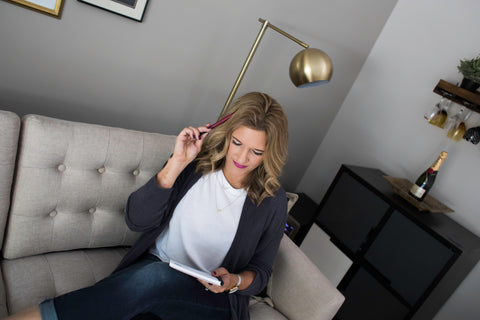




The web is overflowing with productivity hacks and helpful lists of common habits embodied by entrepreneurs, CEOs, and successful people.
Even though YOUR best avenues for productivity will be completely individual to your lifestyle and personality, much can be gained by peeking in at how other female business owners have made it all happen and managed to stay sane.
One commonality among many of these entrepreneurs is that their work approach is calculated – they dream, they plan, they organize, and they orchestrate.
When you plan your day, week, or month in advance, you are creating a locus of support for your business and your sanity.
Here are 9 basic principles behind using a planner as a business owner.
1. Busy women believe in the power of the brain dump
When we’re expected to manage a household, social events, children’s activities, self care, and all of the work for our business or career, things get dropped.
Even those with excellent memory are taking up valuable brain space to retain all the to-dos required in running a business.
Just as ending a few tasks on your computer can clear up its memory and help it operate, your memory space and your current, active thinking processes will thank you when you free them up by writing things down.
2. Visualizing the outcome makes the outcome possible
Visualization is an essential part of making something concrete and therefore achievable. If you have a goal of launching your business, growing your followers, or expanding your product selection, it’s important to work backward and understand all the steps that need to be done to make that dream a reality.
If you don’t know where you’re trying to end up, you can’t choose the steps to get there. Most successful female entrepreneurs swear by using a physical planner because it helps them make more intentional choices every day, every week, and every month toward a visualized outcome.
3. Successful women have meaningful mornings
Having a meaningful morning means starting your day by setting an intention for the day, planning your tasks, jotting your to-dos, and considering your appointments or deadlines before you begin.
When you know exactly where you’re headed for the day, you can strategize the best place to begin and fit your tasks in between the meetings, workout classes, and kid pick-ups.
4. Screen-free moments are precious
It's true, you likely have an iCal or Google Calendar synced for all of the appointments, calls, and musts in your day. And yes, you probably have countless documents on your laptop with ideas, plans, to-dos, and points of focus.
There’s nothing wrong with the efficiency of productivity apps or the immediacy of a digital calendar ... but the moments we spend screen-free are valuable among the hours spent staring at phones, laptops, cameras, tablets, TVs, and even that “smart” fridge your husband had to have.
It’s powerful for us to physically write and review our plans to keep them tangible. In a sea (or cloud?) of typed-and-forgotten “memos,” it can also be powerful to remember where you put that important note-to-self – right there in your business planner.
5. Sometimes, increments are all we can handle (and that’s OK!)
Your business started out as a big, sweeping idea. Maybe you realized you were REALLY good at baking and wondered if you could monetize on that talent.
Maybe you were sitting in yet another pointless meeting at work wondering if there was a different destiny for you. Perhaps you looked into the faces of your loved ones and wanted better for them.
Whatever it was, it started out as a hunch. Once you started looking at all the different facets to launching and managing that business – the money, the marketing, the networking, and the development – you may have felt buried under to-dos.
It can be important to break those big ideas like “Grow my social media following” or “Design product packaging” into smaller subtasks. The proprietary design of The Launch Planner does some of this hard work for you by prompting the compartmentalization of every facet of your launch.
6. When you’ve blocked the time, you’ve got the time
Prioritization is everything. If we don’t plan what we’re going to do in a day, we will undoubtedly be pulled in every direction by distractions, kids, coworkers, social obligations, and the tasks that are the most fun instead of the most important.
According to a study by AtTask, participants self-cited that they only spend about 45% of the allotted time for work, working. Further, 35% of those people pinned lack of prioritization as the cause, and another 36% noted lack of process.
If you block your time – the time you need to do each task, blocks for lunch or meetings, and even time for self care! – you can be sure that each task is exactly where it needs to go, with enough time allotted to do it.
7. Looking backward helps you propel forward
One of the most fantastic resources to help you make decisions and motivate your next steps is your own mistakes, losses, wins, and experiences. When you use a planner, you can go back to that phenomenally productive week you had to review what worked so well for you before.
Likewise, if you had a rough week where you felt overworked, less motivated, or distracted by other things, you can go back and see why that might be. Your planner is also a great place to annotate the meetings you’ve had and the maybes you’ve tried, to see what prospects might be available for your next big challenge.
8. Seeing it in-print helps us identify our limitations
Lesley Gillespie is an Australian entrepreneur who lives by this mantra. One of her 5 tips for building a multi-million dollar business is to delegate.
When you plan your activities and the needs of your business week after week, you’ll be able to see where you get stuck, spend too much time, or overcommit. These are the red-flags that tell you its time to ask for help.
9. Feeling prepared bolsters our confidence
Amy Gallo of the Harvard Business Review recommends that entrepreneurs like yourself start building confidence by making preparedness a priority. When you know what’s next – today, this week, or on the horizon of your business – you can feel confident at every step.
Confidence helps us secure better partnerships, make clearer choices, and delegate when we need to.
If you’re someone who always believed you could keep everything together on your own, don’t feel like using a planner means giving in.
Using a planner is not a sign of weakness, it is a sign that you have ambition, drive, and a heck of a lot going on behind the scenes. By taking on the immense responsibility and demand of owning your own business, you’ve earned yourself a little extra brain space, a keeper of all the things, and a partner in planning.